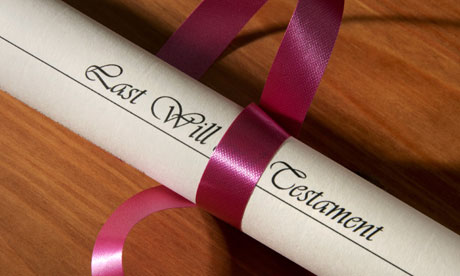A will is a legal document that decides what should happen to your estate (your property, possessions and money) when you die. Really everyone should have one, but in the UK most people (60 – 70%) die without a valid will. That means they die ‘intestate’ and the rules of intestacy will apply to their estate.
Those rules may well not distribute your estate in the way you would wish. For example, if you have a partner but you are not married (and you are not in a civil partnership with a same-sex partner), the rules of intestacy will leave them nothing; they are simply not recognised by the law of intestacy.
Yet making a valid will is really not very difficult, and need not be expensive for most people. Even if it seems expensive, it will prevent possibly complex and stressful complications for those you leave behind; resolving such complications can become extremely expensive.
Making a will
To make a will you need to be 18 or over, and mentally capable of doing so – in other words, of sound mind. The legal test of what that means is quite complex, but essentially you must know what it is you are doing in making a will, roughly what assets you own, who your potential beneficiaries are, and how in fact you intend to distribute your estate. You must make your will without being unduly influenced by somebody else.
You need to decide who should receive what when you die. People who receive something in a will are called beneficiaries. For many people, their choice of beneficiaries will be obvious: spouse/partner and/or children. For others it may be more complicated, because of more complex family or financial circumstances. Even in the simplest cases, there are good reasons to obtain professional advice rather than try to make your own will. For example, you should think about what you would like to happen to your estate if your first choice of beneficiaries die before you or with you. These are obviously grim things to have to think about, but by doing so you are helping those whom you may leave behind.
Tax planning is a further reason to seek professional advice about your will.
Appointing executors
In your will you should appoint at least two executors. They are the people who will manage your estate when you die, so you should think about whether the people you appoint are capable of dealing with financial and legal matters. Executors can be, and commonly are, beneficiaries. Some people choose to appoint a professional as an executor – a solicitor, or a bank – but they will generally charge for their time, so their scale of charges should be carefully checked. If you appoint such a professional, it is worth ensuring that they will agree that they will retire as executors without charge or obstacle if the beneficiaries so desire. Executors who are lay people (ie not estate-management professionals) can always call on the services of a solicitor or accountant if they need help; in that way, they can pay just for those discrete tasks that they themselves cannot or do not wish to undertake.
Who will get what
You can give specific items and amounts of money to specific beneficiaries in your will. You can be as particular as you like, or at the other end of the spectrum leave everything to your beneficiaries in certain shares. If you decide to create legacies of particular assets or items, make sure that you describe those items very accurately: certainty is very important in a will. You also need to consider that some things may evolve, be destroyed, change their value, or be disposed of between the time you make your will and when you die. For example, you might decide to leave 500 shares in a company to somebody; but some time later that company may merge with another and change its name – if your gift of the original shares seems uncertain by the time you die, that gift may fail, and its intended beneficiary will not receive it. If you are in any doubt, you should obtain legal advice.
Some assets are not passed by your will: for example, real property that you jointly own with somebody else as ‘joint tenants’ will pass automatically to your co-owner(s). Jointly-owned property can be owned as ‘tenants in common’ or as ‘joint tenants’. (Don’t be misled by the word ‘tenant’.) If you are joint tenants, your share automatically passes to your co-owner(s) on your death; tenants in common can pass their share by will. Your title deeds will say how you own your property, but you should seek legal advice if you are unsure. Life insurance also ordinarily falls outside your will.
Getting married?
If you get married or enter a civil partnership after making a will, you must make a new will or affirm your existing one (unless your will clearly states that it was made in contemplation of your marriage/partnership). If you don’t, your will is made invalid by the fact of your marriage or partnership. If you separate or divorce from your spouse or civil partner, again you will probably want to make a new will.
The technicalities
The technicalities of a will are fundamentally important. A will must be in writing. It must be signed by the testator (the person making the will) in the presence of two witnesses, and they in turn must sign in each other’s presence and in the presence of the testator. In other words, you must all be together at the same time and all sign there and then. The witnesses should never be people who stand to benefit from the will (that includes people married to those who stand to benefit), or those who are named as executors in the will. If you are a beneficiary in the will and you have witnessed it, you will lose your right to benefit under the will.
Getting the witnessing of a will right is crucially important, yet many wills fail because they are not witnessed correctly. This can have devastating consequences – the law will generally not overlook even slight mistakes in a will, as it might in other legal documents. That means your will, which in all other respects is sound, is invalid; or is the cause of possible contention between beneficiaries and/or other family members.
Who can help you make a will
A great way to make a will is during the month of November, through the Will Aid scheme. Instead of solicitors charging their normal fee for preparing your will, they do it for nothing; in return you give a donation to Will Aid, which distributes the donations to nine charities: ActionAid, British Red Cross, Christian Aid, AgeUK, NSPCC, Save the Children UK, Sightsavers International, SCIAF and Trocaire. In 2009 it raised more than £900,000. Will Aid’s suggested donation is £90. It is available for the preparation of a basic will – if your circumstances mean that you need a complicated will (for example, with complex trusts required), then Will Aid may not be appropriate.
As well as giving to good causes, Will Aid can be a very useful prompt to make you do something that perhaps you have been putting off.
There are lots of DIY wills available in the shops and on the internet. These may be perfectly adequate if your needs are not complex, and as long as you are careful to follow the instructions precisely, in particular regarding the attestation clause (the bit where you sign with the two witnesses). If you purchase a will online, read the small print carefully – it may be that the website excludes nearly all liability to you. It could be that for not much more money, you could obtain the services of a solicitor, whose work will be backed by professional indemnity insurance.
You can find a firm of solicitors to help you write a will. You should select a solicitor who either specialises in wills and probate matters, or who has considerable experience and training in that area. You should ask any prospective solicitor about their level of experience.

